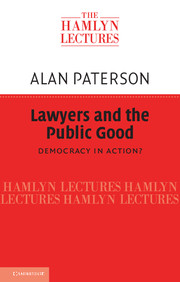Book contents
- Frontmatter
- Contents
- Tables
- Illustrations
- THE HAMLYN TRUST
- The Hamlyn Lectures
- Acknowledgements
- 1 Introduction: determining the public good
- 2 Professionalism re-assessed: what now for lawyers?
- 3 Access to justice: whither legal aid?
- 4 Judges and the public good: reflections on the last Law Lords
- 5 Conclusion
- BIBLIOGRAPHY
- Index
1 - Introduction: determining the public good
Published online by Cambridge University Press: 05 June 2012
- Frontmatter
- Contents
- Tables
- Illustrations
- THE HAMLYN TRUST
- The Hamlyn Lectures
- Acknowledgements
- 1 Introduction: determining the public good
- 2 Professionalism re-assessed: what now for lawyers?
- 3 Access to justice: whither legal aid?
- 4 Judges and the public good: reflections on the last Law Lords
- 5 Conclusion
- BIBLIOGRAPHY
- Index
Summary
Miss Hamlyn, a not particularly well to do but widely travelled spinster and daughter of an English solicitor, bequeathed the world a startling bequest– a bequest so far-sighted that her trustees immediately sought guidance as to whether it was void from uncertainty since the beneficiaries were that indeterminate category ‘the Common people of this Country’. Fortunately for the legal world, counsel was of the opinion that this meant the UK public and the judge in Chancery, a mere six years later, agreed. Bleak House this was not, however, since the capital of the trust remained largely intact. The novelty of the bequest was twofold. First, it was to fund public legal education– a concept which was not invented for another fifty years. Secondly, the lectures were not to instil in the public an awareness of their rights so much as to heighten their consciousness of the responsibilities and obligations imposed on them from living in a country that believed in the rule of law. I have no doubt therefore that Miss Hamlyn would have approved of ‘Lawyers and the Public Good’ as a title for the lectures– and also their iconoclastic theme– namely, that legal institutions are too important in a modern democracy to be left to lawyers alone.
But first a word of explanation. The honour of being only the second Scots academic to deliver these lectures (Professor Sir T. B. Smith was the first) should have fallen to Sir Neil MacCormick, but his untimely illness and death prevented this, and the mantle fell to me. I think I was Neil’s first doctoral student, since in 1969 he became the co-supervisor of my D.Phil at Oxford. It was on the Law Lords– and partly at Neil’s suggestion the Law Lords will feature strongly in my lecture on the judiciary. Neil shared my fascination in the process of judicial decision-making and was the ideal supervisor for a young person in need of confidence and reassurance whenever writers’ block came to call. His enthusiastic optimism has stayed with me throughout my professional career.
- Type
- Chapter
- Information
- Lawyers and the Public GoodDemocracy in Action?, pp. 1 - 4Publisher: Cambridge University PressPrint publication year: 2011



